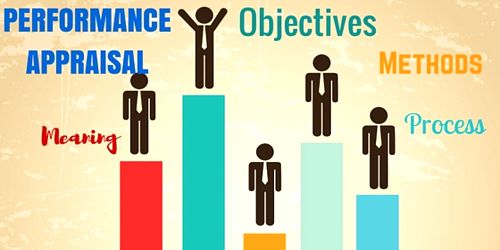Performance Appraisal
Performance Appraisal may be defined as a structured formal interaction between a subordinate and supervisor, that usually takes the form of a periodic interview (annual or semi-annual), in which the work performance of the subordinate is examined and discussed, with a view to identifying weaknesses and strengths as well as opportunities for improvement and skills development.
A critical factor related to an organization’s long-term success is its ability to measure how well employees perform and then use that information to ensure that performance meets present standards and improves over time. This process is referred to as performance appraisal or performance evaluation. It can also be defined as the process by which an employee’s contribution to the organization during a specified period of time is assessed. If used effectively, it can improve employee motivation and performance.
Once the employee has been selected, trained and motivated, he is then appraised for his performance. Performance Appraisal is the step where the Management finds out how effective it has been at hiring and placing employees. If any problems are identified, steps are taken to communicate with the employee and remedy them. Performance Appraisal is a process of evaluating an employee performance in terms of its requirements.
Performance Appraisal can also be defined as the process of evaluating the performance and qualifications of the employees in terms of the requirements of the job for which he is employed, for purposes of administration including placement, selection for promotions, providing financial rewards and other actions which require differential treatment among the members of a group as distinguished from actions affecting all members equally.
Performance appraisal is a formal system that evaluates the quality of a worker’s performance.
An appraisal should not be viewed as an end in itself, but rather as an important process within a broader performance management system that links:
- Organizational objectives
- Day-to-day performance
- Professional development
- Rewards and incentives.
Importance and Purpose
Performance Appraisal has been considered as the most significant an indispensable tool for an organization, for the information it provides is highly useful in making decisions regarding various personnel aspects such as promotion and merit increase. Performance measures also link information gathering and decision making processes which provide a basis for judging the effectiveness of personnel sub-divisions such as recruiting, selection, training and compensation. Accurate information plays a vital role in the organization as a whole. They help in finding out the weaknesses in the primary areas. Formal Performance Appraisal plans are designed to meet three needs, one of the organization and the other two of the individual namely:
- They provide systematic judgments to back up salary increases, transfers, Demotions or terminations.
- They are the means of telling a subordinate how he is doing and suggesting needed changes in his behavior, attitudes, skills or job knowledge. They let him know where he stands with the Boss.
- Superior uses them as a base for coaching and counseling the individual. On the basis of merit rating or appraisal procedures, the main objectives of Employee Appraisal are:
- To enable an organization to maintain an inventory of the number and quality of all managers and to identify and meet their training needs and aspirations.
- To determine increment rewards and to provide reliable index for promotions and transfers to positions of greater responsibility.
- To suggest ways of improving the employee s performance when he is not found to be up to the mark during the review period.
- To identify training and development needs and to evaluate effectiveness of training and development programmes.
- To plan career development, human resource planning based potentials.
Fundamentals of an Appraisal system
In order to be effective, an appraisal system needs to be perceived by workers as:
- Relevant and applicable to everyday work.
- Acceptable and fair.
- A mutual collaboration between management and workers.
A performance appraisal system that meets these criteria is likely to have the greatest impact on workers’ satisfaction with the appraisal process and their motivation to improve performance.
Appraisal Methods
In a landmark study, Performance appraisal system has been classified by Locher & Teel (1977). He found that the three mast common performance
Appraisal methods in general use are:
- Rating scales (56%)
- Essay method (25%) and
- Result – oriented or MBO methods (13%).
Certain technique in performance appraisal have been thoroughly investigated , and some have been found to yield better result than others.
Encourage Discussion
Research studies show that employees are likely to feel more satisfied with their appraisal result if they have the chance to talk freely and discuss their performance. It is also more likely that such employees will be matter able to meet future performance goals. Employees are also more likely to feel that the appraisal process is fair if they are given a chance to talk about their performance. This especially so when they are permitted to challenge and appeal against their evaluation.
Constructive Intention
It is very important that employees recognize that negative appraisal feedback is provided with a constructive intention to help them overcome present difficulties and to improve their future performance. Employees will be less anxious about criticism, and more likely to find it useful, when the believes that the appraiser’s intentions are helpful and constructive. In contrast, other studies (Baron 1988) have reported that “destructive criticism “– which is vague, ill– informed, unfair or harshly presented – will lead to problems such as anger, resentment, tension and workplace conflict, as well as increased resistance to improvement, denial of problems, and poorer performance.
Set Performance Goals
It has been shown in numerous studies that goal-setting is an important element in employee motivation. Goals can stimulate employee effort, focus attention, increase persistence, and encourage employees to find new and better ways to work. The useful of goals as a stimulus to human motivation is one of the best supported theories in management (Locher, 1977). It is also quite clear that goals which are specific , difficult and accepted by employees will lead to higher level of performance than easy, vague goals (such as do your best) or no goals at all (Harris 1914).
Appraiser Credibility
It is important that the appraiser (usually the employee’s supervisor) be well-informed and credible. Appraisers should feel comfortable with the techniques of appraisal, and should be knowledgeable about the employee’s job and performance (Teel, 1977). When these conditions exist, employees are more likely to view the appraisal process as accurate and fair. They also express more acceptances of the appraiser’s feedback and a greater willingness to change.
















